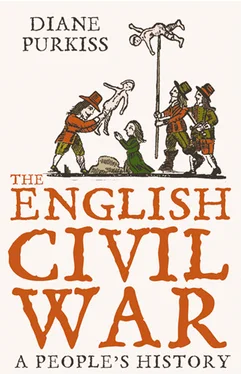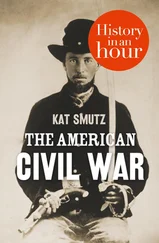VII The Valley of Decision
The king had set up his standard before London had begun to gather troops. It was 22 August 1642, as a newsbook reported:
His Majesty came weary out of Warwickshire to Nottingham, and after half an hour’s repose, commanded the Standard to be brought forth, which was carried by a Lord, His Majesty the Prince, the Duke of York, and diverse Lords and Gentlemen accompanying the same, as soon as it was set up, his Majesty called for the printed Proclamation, mended with pen and ink some words misprinted, or not approved of, and caused the Herald to read the Proclamation three times, and so departed.
The same newsbook went on to say, ‘They plunder all men’s houses whom they please to call roundheads, and bring in cartloads of household stuff and sell them before the court-gate.’
The contrast between the king’s standard-raising and the murky behaviour of his troops is clear. What the newsbook writer didn’t know was that even the standard-raising was something of a public relations disaster. For one thing, it was pouring. For another, the standard had to be planted in a hole scraped out of the mud with knives and bare hands. Finally, not many had as yet rallied to the king, and the standard was unfurled before a meagre assortment of three cavalry troops and one infantry battalion. Worst of all, the wind blew the standard down into the mud during the night. For a people saturated in Biblical portents, it was a sign of doom. For a man like Charles, to whom ceremony was the vessel bearing the precious liquor of authority, it was ominous. But he was committed, now, to war. Charles longed for military settlement, for a simple battle where he could beat his foes and show them to be traitors, treat them as the rebels they were. ‘I am going to fight’, he said, ‘for my crown and dignity.’
And blood had already been shed. When William Brereton tried to raise troops for Parliament in Chester, he and his men were set upon by an angry mob. The Earl of Bath got a similar reception in Exeter. When Ralph Hopton rode into the small town of Shepton Mallet, he was hoping to recruit more men for the king. It was 1 August. But a thousand or so men turned out to stop any recruitment. Both Hopton and his foes withdrew to gather their forces. Three days later, the two troops met at Marshall’s Elm. It was a Royalist victory, and twenty-seven Parliament-men lay dead. Only a skirmish, it was nevertheless the first real fighting of the war.
‘Are you for the king, or Parliament?’ schoolboys used to cry. In the war years, soldiers stopped all comers and asked them, ‘King or Parliament?’ But when conflict first began, it did not begin with the choice of sides, but with their formation from much more inchoate and various positions.
Before Charles raised his standard at Nottingham in August, it only became obvious as the months of late summer slid by that there were any sides to take, and even then it was not at once apparent that there were only two; at first there was room for many sides. Caught up in the unfolding events and in the hot tide of feelings running through the three kingdoms, the people did not know that they were about to fight an ‘English Civil War’. Some thought that they were beginning a religious war against the Antichrist. A subset of these thought that they were fighting against a vast conspiracy of Catholics who were plotting to subvert Church and state, others that they were fighting to protect Church and state against a vast rebellion against just and legitimate authority. Still others thought the war was merely a simple and obvious matter of honour, which required that obligations to those higher in the hierarchy be observed at the price of blood. Still others thought they were witnessing a kind of rebalancing, where Parliament was about to curb the excesses which had grown upon the king and his counsellors of late. Others thought that what was happening was a chance for regions normally excluded from the processes of government to make their voices heard. Some people thought it an ideal chance to make war on neighbours that they had always disliked. Others thought it a chance to get rich quickly, with plenty of plunder available. A few – not many – thought that England would do better as a republic like Rome or Venice. A very few thought the end of the world was coming.
Because men and women thought in these diverse ways, the ‘English Civil War’ was not one war, but many; within each ‘side’, there were ancillary struggles to define that ‘side’s’ purpose. Labels like ‘Royalist’ and ‘Parliamentarian’ describe coalitions of difference, coalitions that sometimes broke under pressure. These same pressures would break many men and women, and because choices were often so finely balanced, families broke too.
Two hundred and fifty years or so before the king abandoned London, Geoffrey Chaucer had described a group of pilgrims gathering there, all sorts and conditions of men and women, their various statuses, professions and trades. His diverse men and women were to share a journey to redemption, and exchange stories. In 1642, the social hierarchy and many of the conditions of men he described still existed, though some of the clerical orders had been swept away by the Reformation. But all three kingdoms were still societies of sorts and conditions, societies in which people’s choices and tales were shaped by the place they occupied. In 1642, these sorts and conditions of men and women were to share a different and more painful journey, not towards redemption, but to the perdition of war. And they all had stories to tell on the way. Every kind of person in 1642 had to make their own sense of what was happening. Powerful nobles like Lucy Hay, gentlemen like Ralph Verney, tradesmen like Nehemiah Wallington, serving-women like Anna Trapnel – all were united and divided by the terrible choice before them. Like Chaucer, we can ride swiftly past a representative few of those estates and persons, and hear fragments of their stories. But unlike Chaucer, we do not have equal access to every estate. Most – though not all – of those who wrote down their decision-making and its origins were the better-off, with leisure, literacy and ambitions. We do not have anything like as many stories from the lower orders as we would wish, though we have some, and as we shall see, one good effect of the war was to enable ordinary soldiers to find a voice that would be heard. But for now, before the war has begun, we will be hearing mainly from what Chaucer would have called the gentil, the nicely born and bred.
We may begin with The Gentlewoman’s Tale, the story of the choices made by Brilliana Harley. The Harley family of Brampton Bryan, Herefordshire, were an especially united family due to their shared beliefs. Brilliana’s father was Sir Edward Conway, Governor of Holland and Zeeland during their revolt against Spanish rule in the 1570s, so uncannily predictive of the Civil War in its anti-monarchic violence, iconoclasm, and cries of ‘liberty!’ Born in 1598, she was in early middle age when the conflicts began, forty-four or so. Anne Fairfax, the wife of Parliament’s most important general, was her cousin.
Until the war, Brilliana’s life was dominated by family life and religion. Early modern women dreaded infertility because they were usually held responsible for it, and once pregnant they feared miscarriage and stillbirth because they were considered the fault of women too. It was widely believed that the mother’s imagination could act upon the child during conception or pregnancy, causing deformities. Looking at a picture of John the Baptist at the moment of conception could create a child covered in hair, while gazing at a hare might cause a hare lip. Birth, too, was dangerous for mother and child. Women feared the death of the child: Alice Thornton dreamt of lying in childbed with a white sheet spread, but drops of blood sprinkled on it. ‘I kept the dream in mind till my child died’, she wrote. Lady Eleanor Davies was haunted by the image of a dead child which she saw in her dreams. Women also feared that they might die themselves. Elizabeth Joscelin was not the only pregnant woman to compose a loving letter of advice to her unborn child in case she was not available to guide the child in person. In her case her fears proved well grounded, and she died soon after giving birth. Lucy Hutchinson’s grandmother lost her wits after a difficult birth.
Читать дальше












